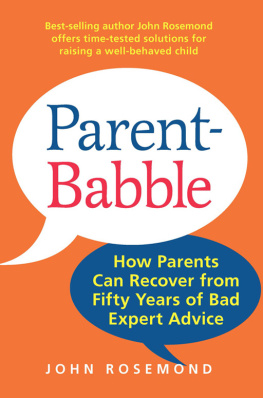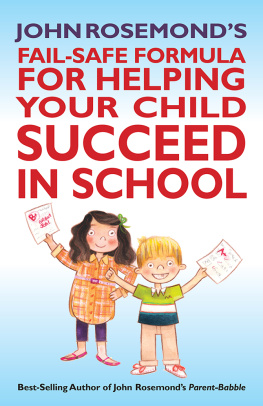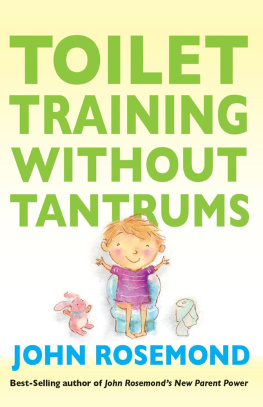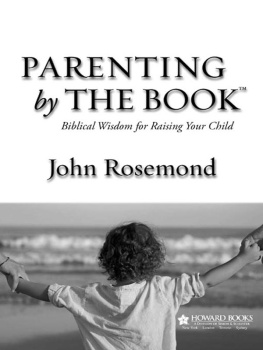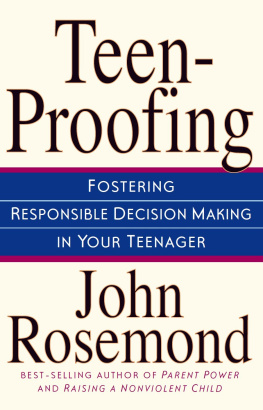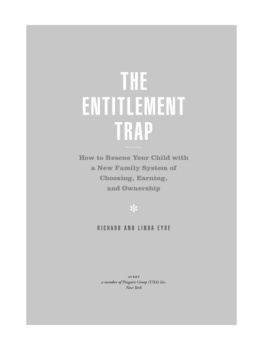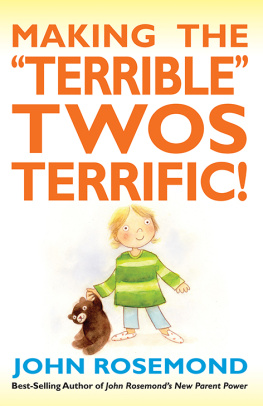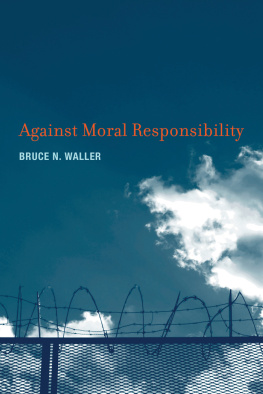John Rosemond - A Family of Value
Here you can read online John Rosemond - A Family of Value full text of the book (entire story) in english for free. Download pdf and epub, get meaning, cover and reviews about this ebook. year: 2012, publisher: Andrews McMeel Publishing, genre: Children. Description of the work, (preface) as well as reviews are available. Best literature library LitArk.com created for fans of good reading and offers a wide selection of genres:
Romance novel
Science fiction
Adventure
Detective
Science
History
Home and family
Prose
Art
Politics
Computer
Non-fiction
Religion
Business
Children
Humor
Choose a favorite category and find really read worthwhile books. Enjoy immersion in the world of imagination, feel the emotions of the characters or learn something new for yourself, make an fascinating discovery.

- Book:A Family of Value
- Author:
- Publisher:Andrews McMeel Publishing
- Genre:
- Year:2012
- Rating:5 / 5
- Favourites:Add to favourites
- Your mark:
- 100
- 1
- 2
- 3
- 4
- 5
A Family of Value: summary, description and annotation
We offer to read an annotation, description, summary or preface (depends on what the author of the book "A Family of Value" wrote himself). If you haven't found the necessary information about the book — write in the comments, we will try to find it.
John Rosemonds A Family of Value presents a critical view of the child care literature of the past quarter century and argues for an end to overindulgent parenting and a return to the goal of instilling moral values, such as responsibility, respectfulness, and resourcefulness.
A Family of Value — read online for free the complete book (whole text) full work
Below is the text of the book, divided by pages. System saving the place of the last page read, allows you to conveniently read the book "A Family of Value" online for free, without having to search again every time where you left off. Put a bookmark, and you can go to the page where you finished reading at any time.
Font size:
Interval:
Bookmark:



A Family of Value copyright 1995 by John Rosemond. All rights reserved. No part of this book may be used or reproduced in any manner whatsoever except in the case of reprints in the context of reviews.
Andrews McMeel Publishing, LLC
an Andrews McMeel Universal company
1130 Walnut Street, Kansas City, Missouri 64106
www.andrewsmcmeel.com
Library of Congress Cataloging-in-Publication Data
Rosemond, John K., 1947
A family of value / John Rosemond.
p. cm.
Includes bibliographical references (p. ).
1. Child rearing United States.
2. Parenting United States. I. Title.
HQ778.63.R67 1995
649\l-dc20 95-23829
CIP

Attention: Schools and Businesses

Andrews and McMeel books are available at quantity discounts with bulk purchase for educational, business, or sales promotional use. For information, please e-mail the Andrews McMeel Publishing Special Sales Department: specialsales@amuniversal.com
To John McHenry Rosemond
Contents
I, Heretic
Through the Looking Glass
Have We Hit Bottom Yet?
Sounds Good, but It Doesnt Work
Why Our Schools Are Floundering
The Politics of Parenting
A Family of Value: Rearing Three Rs Children
The Respectful Child: Good Beginnings
The Responsible Child: Discipline That Works!
The Resourceful Child: A Can-Do Kid
General Questions
Thanks!
Donna Martin, Tom Thornton, Matt Lombardi, Ann Hall, Patty Donnelly, and all the other supportive folks at Andrews and McMeel; Gary Nielson at the Charlotte Observer, for invaluable support and assistance; Kate Greer, Lisa Fann, and Randy Johnson at Hemispheres, for putting up with me; Barb Palar at Better Homes and Gardens, for understanding; Jamie Hoover and the fabulous Spongetones, for allowing me to work out my rock n roll fantasies; Janet Moss and Mary Ellen Dillon, for making sure that life on the road is always a pleasure; Nancy, for going above and beyond; and most of all, Willie, with whom all things are possible.
INTRODUCTION
I, Heretic
If you cannot answer a mans argument, do not panic. You can always call him names.
Oscar Wilde
S ince I began writing my syndicated newspaper column in 1976, it has become increasingly clear to me that the psychological community often functions more like a political party or a religion than a science. For example, although it often pretends to matters of fact, psychology consists of nothing more than a set of highly speculative (and constantly changing) theories concerning human behavior. Believing in these theories requires faith, and psychology certainly has its share of true believers. These theories constitute psychologys ideology or canon, and as is the case concerning an organized political party or religion, they are the subject of constant intraprofessional debate. There is, however, an unwritten rule that no party to these debates may ever say that another party is dead wrong. One may express skepticism, or reserve judgment, or politely disagree, but one may not scoff. Consequently, conflict among members of the profession almost always takes place with extreme respect for form, and always within the context of a certain agreed-upon party line. Psychologists may sneer at the ideas and methods of mainstream psychiatry, but they may not sneer at mainstream psychology. Not without penalty, that is.
This is much the way political and religious debate is conducted. Catholics, for example, may differ greatly with Jews concerning spiritual matters, but a Catholic expresses public opinion inconsistent with church canon at the risk of sanction of one sort or another. Likewise, Democrats may disagree on how to implement welfare, but a Democratic politician who desires continuing party support does not dare offer that welfare itself is an evil. In each case, deviation from the implicit limits imposed upon any debate is considered heresy, and even in America, where freedom of speech is supposedly guaranteed by the Constitution, professional heresy is always subject to censure, whether formal or informal.
I know this because I am a heretic within my profession. My views on child rearing and family life are psychologically incorrect. They rock the boat, upset applecarts, and provoke often vitriolic response. The simple explanation is that I have been willing to publicly state my disdain for the child-rearing ideology propounded since the 1950s by mainstream psychology. Furthermore, I go so far as to propose that previous generations of American parents reared children generally well. There was a little room for improvement, to be sure, but there was never any call to toss the baby out with the bathwater. As the reader will see, I am basically restating what our ancestors took for granted concerning family life, and the parent-child relationship in particular. I am relegitimizing their attitudes, their beliefs, their values, and their practices. As long as there are psychologists who believe they have better ideas concerning child rearing than were held by our forebears, there will be psychologists who think I am a menace, and who display, in their denouncements, their intolerance for ideas inconsistent with their own parochial philosophy. In that context, I accept that I am a heretic. I not only accept it, I am proud of it, and I will continue to be a heretic until psychology gets its head out of the clouds and its feet on the ground. In anticipation of that, Im not holding my breath.
The Heretics Tale
This book extends the chronicle of a personal and professional revolution that began in 1972, three years after the birth of our first child, Eric, and continues today. During graduate school, I had been successfully indoctrinated into the nouveau ideology concerning child rearing then being advanced by mainstream psychology. Central to this ideology was a nebulous psychic ether that psychologists were calling self-esteem, which adults were obligated to activate in children by making them feel good about themselves. This, said psychologists and other helping professionals, was accomplished via massive, ongoing doses of praise and attention. Like most of my professional peers, I regarded myself as an apostle sent out from academia to spread the gospel of this secular religion. I was convinced that psychology was capable of saving humanity from destruction by its own hand. If enough people would listen to psychologys high priests and priestesses and practice its prescriptions for living, we could create a nearly perfect world! Or so I thought.
Unlike many novice psychologists, however, I was a parent in the early 1970s. Eric Brian Rosemond was born in 1969, during my tenure as a graduate student. Determined not to repeat the grievous errors we had been led to understand our parents had made with us, my wife, Willie, and I were rearing Eric by the book. It slowly dawned on us, however, that the promises of nouveau child rearing were clashing with the reality of Erics behavior. He was, as my grandmother would have said, a holy terror. He threw wild, violent tantrums when thwarted in any way, refused to cooperate with most of our instructions (the exceptions being those along the lines of Cmon, Eric, lets go get some ice cream), was loudly demanding, and was stuck in warp drive most of the time. Otherwise, he was a wonderful, charming child. Especially when he was asleep.
Next pageFont size:
Interval:
Bookmark:
Similar books «A Family of Value»
Look at similar books to A Family of Value. We have selected literature similar in name and meaning in the hope of providing readers with more options to find new, interesting, not yet read works.
Discussion, reviews of the book A Family of Value and just readers' own opinions. Leave your comments, write what you think about the work, its meaning or the main characters. Specify what exactly you liked and what you didn't like, and why you think so.

